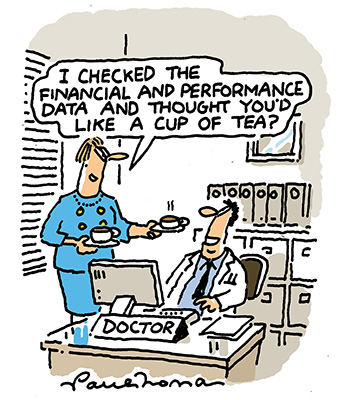Working with doctors
With NHS services under extreme pressure, managers and doctors need great working relationships. Umesh Prabhu shares his tips for working more effectively with your medical colleagues.

1. Respect each other
Doctors and managers are both under severe pressure for different reasons. Doctors struggle to provide the best care but there isn’t enough money. Managers struggle to manage budgets and meet targets. To work together, doctors and managers must understand each other’s difficulties and needs. That means we need to respect, listen to, engage with, praise, value and challenge each other.
2. Get to know doctors
Go and meet the doctors in your organisation individually. Ask them, “What’s your plan? What do you want to do? How can I help you improve patient care?” I believe around 80% of doctors are reasonable and easy to deal with. The rest may be cynical and resistant to change, but most can be helped – only 1-2% are actually bad doctors. Get the most co-operative and engaged doctors on your side – let them tackle the more difficult ones. And avoid talking to doctors in a group; the herd mentality takes over and only the most vocal people will talk.
3. Talk the same language
Most doctors and nurses don’t think about resources and aren’t trained in finance – they instinctively think only about patient safety. So you need to change your language. Don’t tell doctors you want to save money, tell them you want to use resources effectively to improve the quality and safety of services. And then ask them: how can you help?
4. Show doctors the evidence
Doctors like data. If you tell me, “Umesh, you’re wasting money, we’re going to do X”, I won’t co-operate. But doctors are fiercely competitive and if you show me the financial and performance data, I’ll be interested and will help you solve the problem. But make sure you’ve got your figures right: doctors won’t trust you if you give them inaccurate data more than once or twice.
5. Ask doctors for help
Like most people, doctors hate being told what to do. But if you respect doctors and ask them for help, they will melt in front of you. And they will tell you how to do it. Managers don’t involve doctors enough in decisions about finances and meeting targets, but doctors are very bright and like solving complex problems – so don’t waste the skilled resources at your disposal.
6. Train doctors and managers together
I believe teaching doctors to be good leaders is the key to transforming the NHS, but you must train clinical and general managers together and within your own organisation. At Wigan, Wrightington and Leigh, basic leadership training was mandatory for anyone who wanted to be a clinical leader. We spent eight days training them in behaviour, leadership, clinical governance, team working, patient safety, finance and value for money, change management, good HR practice, and having difficult conversations.
7. Find the best leaders
Handpick your leaders by talking to nurses, junior doctors, GPs and so on. I just asked them five questions: Who’s the best consultant? Who’s a nice human being? Who’s a good team player? Who do you want to see as the leader? And why? Everyone knows my mantra by now: “happy staff, happy patients”. It’s a leader’s job to create a culture of staff happiness.
8. Don’t be intimidated
Some doctors are a nightmare to manage but they’re very easy to inspire and lead. Try to listen to doctors and engage them – leave “management” to the clinical directors. Don’t be intimidated into avoiding talking to doctors about how your organisation is run. If you open a dialogue, you may be surprised how co-operative even difficult doctors can be.
9. Take responsibility
Be honest about what problems you can solve and take responsibility for raising those you can’t with more senior managers or the board. Patient safety and quality of care is everyone’s job. A robust system of clinical governance is very important – it means everyone is accountable for their behaviour and everyone gives feedback and support. Too much NHS management is reactive – responding to problems with sanctions, blaming and shaming – when we should be proactively listening to staff and supporting them to make changes.
10. Give doctors a sense of belonging
To many doctors, trusts feel like remote bureaucratic institutions. So it’s vital for the board to make themselves visible and available. At Wigan we invited junior doctors and consultants to contribute to board and other important meetings and helped them to understand how difficult managers’ jobs are. When even the most junior doctor feels they can go to the medical director, you’ll know you’re getting the culture right.
Umesh Prabhu was medical director at the multi-award winning Wrightington, Wigan and Leigh Foundation Trust from 2010 to 2017.
Related News
-

Tipster: How to do your own quarterly review
Executive coach Jane Galloway explains how taking time to reflect on your last quarter can set you up for a brilliant next three months.
-

Tipster: How to manage in a crisis
Leadership coach and former senior detective Andy Cribbin offers his tips for managers on how to prepare for a crisis, manage calmly and deliver results that people will remember.
-

Tipster: How to restart you career after redundancy
Being made redundant or looking for work in later life can be an unsettling experience. Lucy Standing, co-founder of older workers support network Brave Starts, gives her tips on how to explore your options and boost your chances of finding the job you want.